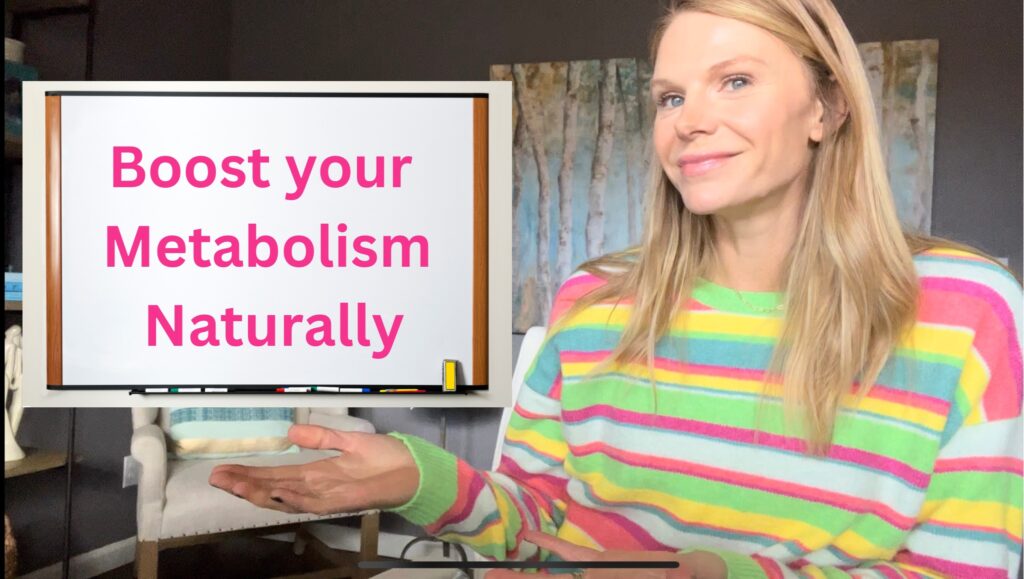Some thoughts and discussions from me.
Boost Your Metabolism Naturally: Effective Strategies to Increase How Much You Burn

Tell me if this sounds familiar:
You used to be able to eat whatever you wanted, whenever you wanted. Now? It’s 20 years later and it feels like your metabolism is broken. You’re wondering how you can boost your metabolism naturally.
The Good News:
Your metabolism is not broken.
But, your habits could use some fine-tuning.
Think back to when you feel like you had a super charged metabolism: What were you doing back then? Were you walking to and from classes, socializing and walking around town with friends, playing sports, or walking to and from meetings?
You were very likely much more active then than you are now.
Even if your life isn’t drastically different now, you’re probably sitting a lot more. Whether you’re driving the kids to and from their activities or sitting in front of a computer working all day, this is very sedentary and lowers your total daily energy expenditure (TDEE, or, the total calories you burn every day.)
If you’re looking to rev up your body’s metabolism, then we need to increase your NEAT, or your non-exercise activity thermogenesis. This basically all the moving you do outside of your workouts all day.
But first, what even IS metabolism and why does it slow down?
Simply put, metabolism is: the chemical reactions in the body’s cells that change food into energy.
Whether your goal is shedding a few extra pounds or maintaining a healthy weight understanding and improving your metabolic rate can be helpful. And luckily it’s really not all that complicated.
What Does the Research Say?
Recent studies show that metabolic rate is NOT affected by age before the age of 60.
SIXTY.
This is GOOD news. Because it means there’s something you can do about it if it seems like your metabolism has slowed as you age.
So if it’s not age, what is it?
As we get older, many of us:
- lose muscle tissue
- eat more calorically dense foods, and
- move FAR less than we used to
And yes, as we age – especially women – our hormones change and estrogen declines as we enter perimenopause. This does impact body fat, but more so where you gain it as opposed to how quickly you gain it.
So what can you do to increase your metabolism naturally as you age?
First, here’s what you don’t need to do.
No, eating metabolism-boosting foods won’t do much at all to increase your TDEE.
Neither will any other pill, potion, Intermittent Fasting, or unlocking the “secret” to hormone/gut/insulin/keto health that fitness “gurus” out there are touting. (Read: they’re trying to make money off of you by making you think that they have some secret solution.)
And actually, it’s not even by exercising more in most cases. Adding more cardio can have diminishing returns, making your appetite higher and reducing your movement outside of your workout so much that up to 50% of the calories burned during your cardio session are lost due to decreased NEAT. Now, I’m not saying cardio is bad. I’m just saying more cardio isn’t always the answer to burning more calories.
Here’s exactly how you can boost your metabolism…naturally.
1. Increase your TDEE by increasing your NEAT (remember: non-exercise activity thermogensis)
2. By increasing your mass (i.e. gaining weight)
I’m going to assume you don’t want to gain weight if you’re here reading about how to boost your metabolism, so let’s discuss increasing your NEAT further.
If you feel like your metabolism has slowed as you age, do THIS:
Become more active.
The easiest way to do this is to simply walk more.
If you have a Fitbit or apple watch or other device that can track steps, check out your daily average step count. Then aim to increase it by 2,000. Read: you don’t need to aim for 10k steps/day. At least not right off the bat. Work up slowly.
Increase your steps and you’ll increase your NEAT and you’ll increase your TDEE, and thusly….your metabolism.
I’d also be completely remiss if I didn’t say that eating a healthy, higher protein diet with adequate fiber — and regular strength training also helps. The more lean muscle tissue you have, the more you burn (though recent studies have pointed out that this isn’t as much of an increase as we once thought.) But regardless of metabolism, strength training leads to maintaining or building muscle tissue, which is one of the best things we can do for our health as we age – especially women.
